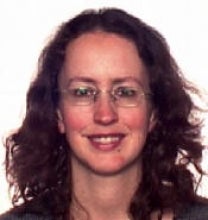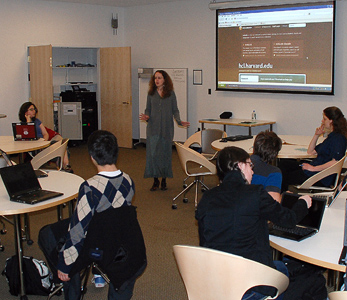Special Guest: What Do Librarians Do All Day? Or, a Day in the Life of a Music Librarian

Like many librarians, I am often asked if I read books (or listen to recordings) all day long. I realize this question is often asked with tinges of envy since, in academia, we are all in our lines of work because we love books and music. But it does reveal the fact that many people have no idea what librarians and archivists spend their time doing. This is a real concern for those of us in a field whose value is somewhat in jeopardy. My wonderful colleague Maureen Russell addressed this everyday work issue in one of her columns, giving a snapshot of the invaluable work of ethnomusicology archivists. Since my job is heavily focused on ethnomusicology, she graciously invited me to contribute to this column.
I’ll start by explaining myself. My name is Liza Vick and I am Music Reference and Research Services Librarian at Loeb Music Library, Harvard University. Since I have a masters degree in ethnomusicology (as well as one in library science) I work heavily with the Archive of World Music (AWM), housed in our library. In a sense, I’m Maureen’s librarian counterpart, performing similar functions as she does in the UCLA Ethnomusicology Archive (although I do not process or catalog archival collections). Our Archive of World Music features fieldwork collections from South India, Turkey, Iran, Siberia, China, Ethiopia, Latin America, Eastern Europe and more. It also houses many commercial recordings of world music. The director of our library (Eda Kuhn Loeb Music Library, Harvard) is also the curator of the Archive of World Music, with a senior curatorial assistant who assists with acquisitions, does archival processing, creates finding aids, and the entire public services staff assists with reference and instructional services (this is where I enter in). The professional catalogers provide access and metadata for the recordings and assist with finding aids. A former director of the Archive, Dr. Virginia Danielson, is a Merriam prize winner, author of Shaping Tradition in Arabic Song: the Career and Repertory of Umm Kulthūm. Dr. Danielson also co-edited the Garland Encyclopedia of World Music, Volume 6: The Middle East. As one can see many librarians and archivists are active scholars and there is not as much of a divide as one might think.
So this brings me to a day in my life (only a small slice of what happens in an archive, but it’s my slice). While I do love music and books, my job involves much more than that, and rather than consuming library materials all day, I research answers to questions from researchers worldwide and at Harvard, mediate between users and electronic interfaces, and make researchers aware of our treasures. I’d like to provide a hypothetical day here (not a typical one, since there is no such thing, but this does encompass my job duties). Librarian and archivist jobs contain far more variety than most people would suspect and our lives are far from boring! Most of us work hard and find our work highly enriching and enthralling (well okay, most days we do).
A Day in the Life of a Research Librarian (there are many other types of music librarians, but I’m covering what I know best). I also work with historical musicology, theory and composition, but for the purposes of this column, we’ll focus on ethnomusicology:
Early Morning: Collection Development (read reviews, listserv announcements, send orders to acquisitions): I do collection development just for books about Indian (South Asian) music. Our staff works collaboratively: The AWM curator collects majority of books, and her curatorial assistant selects media (audio, video). The curator also solicits and mediates requests to donate scholarly collections.
Loan mediation: With the help of our Interlibrary loan office and the Access Services Librarian, arrange for a Harvard doctoral ethnomusicology student to listen to rare recordings of West African music from Benin (recorded by Gilbert Rouget on 78 records) from the UCLA Ethnomusicology Archive (Maureen Russell has graciously offered to digitize, send and make available for in-house listening here). Coast to coast collaboration!
Late Morning: Meet with the AWM curator and a collection donor, a scholar of Siberian music based in Boston (he specializes in music from Yakutia, near Arctic circle). We discuss creating a research guide to support a symposium and exhibit opening based on material from his collection. Recently we participated in a video introduction to the collection, one of the only of its kind outside of Siberia (a major focus is Olonkho sung epic poetry, an endangered art from on the UNESCO Representative List of the Intangible Cultural Heritage of Humanity). This video was directed by a recent PhD in ethnomusicology who studied with Dr. Alekseyev and it accompanies interview with him about his work.
Late Morning: Research Consultation: Meet with individual students from the Introduction to Ethnomusicology graduate seminar; help them find online scholarly resources for final papers and digital exhibit. These topics range from Turkish diaspora hip hop to mining songs from West Virginia, to Ethiopian music used in film, to modes and types of Arabic Maqam.
Lunch: Attend brown bag series featuring student presentations of dissertation research and dry runs of conference talks (Turkish diaspora in Germany, for example). This helps me keep abreast of dissertation topics as they evolve and I also attend the SEM conference regularly as well as MLA (Music Library Association).
Early Afternoon: Teach a class about library skills for a course in the African and African American Studies department called, From Cesaria Evora to Dama Do Bling: Music, Language, and Digital Media in the Former Portugese Colonies (taught by a recent Harvard PhD with strong ties to ethnomusicology department). I give brief demonstrations of searches in library catalog (HOLLIS), discovery portal (electronic resources such as RILM), and Garland Encyclopedia of Music online. Then we set students loose to search on their own, with coaching and discuss results together. We’ll collaborate with this class throughout the semester, by helping them find objects for digital curation project. These days, we’re increasingly interdisciplinary in focus and moving beyond the “one-shot” model of library instruction.
Late Afternoon: Meet with a graduate student interested in learning more about possibly becoming a music librarian. Arrange a visit to the audio preservation studio for an interdisciplinary general education class about music, art and poetry with emphasis on history of listening technology (funding by a major teaching and learning grant).
Social networking: Update our library twitter feeds and Facebook page with our latest newly acquired electronic resource or ethno collection.
Early Evening: Review proofs for an “extra curricular” research project, the world music section of the Basic Music Library, 4th edition (I’m the associate editor for world music, Maureen Russell is a contributor and we met virtually working on this project!). Librarians and archivists are highly collaborative creatures, a byproduct of the service and sharing nature of our daily work.
What a busy day that was (in truth not a real single day, but an amalgamation of many)! Although in truth, I/we do experience plenty of non-stop days, with very little “down time”. We also serve on committees both on our campuses (library and faculty) and in national and regional associations. I hope this little jaunt through my day has proven interesting, and I hope other librarians and archivists will please comment and contribute to the conversation with their own experiences.

Liza Vick teaching at the new collaborative learning space in Harvard's Lamont Library





